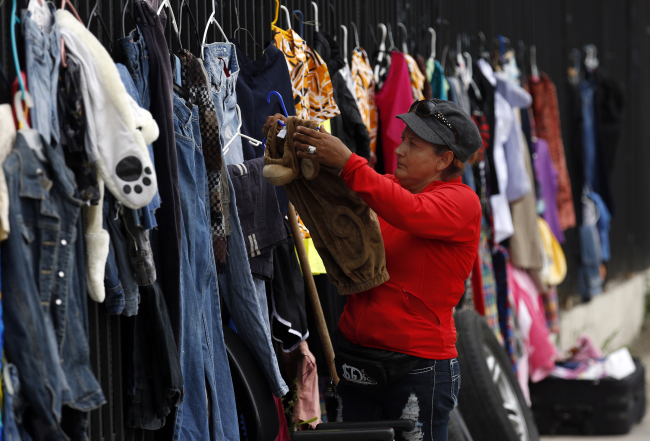LOS ANGELES –– Claudia Flores and her husband were months past due on $60 phone and $80 electricity bills.
So they packed their minivans with strollers, car seats, used T-shirts and assorted other things and drove to a stretch of Figueroa Street just blocks from Imperial Highway in South Los Angeles.
There, they spread their wares on the sidewalk and opened for business.
This part of Figueroa Street has become a shopping bazaar of last resort for people living on the margins.
Every weekend, dozens of people come in battered pickups, vans and old cars filled with possessions, hoping to raise money to pay bills or supplement their low-wage jobs. A street away from the Floreses, a man sold a couch, dressers and shirts. Another sold jeans in front of a laundromat. A group of women sold dresses, blouses, baby toys and power tools.
So they packed their minivans with strollers, car seats, used T-shirts and assorted other things and drove to a stretch of Figueroa Street just blocks from Imperial Highway in South Los Angeles.
There, they spread their wares on the sidewalk and opened for business.
This part of Figueroa Street has become a shopping bazaar of last resort for people living on the margins.
Every weekend, dozens of people come in battered pickups, vans and old cars filled with possessions, hoping to raise money to pay bills or supplement their low-wage jobs. A street away from the Floreses, a man sold a couch, dressers and shirts. Another sold jeans in front of a laundromat. A group of women sold dresses, blouses, baby toys and power tools.

“It would be more convenient for me to work a job than be out here doing this,” said Flores, a Mexican immigrant in the country illegally waiting for a two-year work permit. “I make very little out here. Sometimes I don’t make anything at all.”
Street vendors have long been a part of life in Los Angeles. They are the bacon-wrapped hot-dog vendors outside the Sports Arena the night Bruce Springsteen closed out the place, the Mexican push-cart vendors selling ice cream and mayonnaise-slathered corn cobs on sticks in East Los Angeles, or Chinese immigrants trying to sell homegrown vegetables to Chinese restaurants in San Gabriel Valley.
But the scene on Figueroa and several other streets in South Los Angeles reflects a kind of street vending -- the rooted-in-place sales of things instead of food -- that often gets overlooked.
Vincent Moore, a pastor at Messiah Full Gospel Bible Fellowship at Figueroa and 90th streets, said he noticed people coming to sell things on the sidewalk about a year ago.
“What it generally costs to sustain life on a monthly basis, the majority of the people in this community don’t make it,” Moore said. “So they juggle and they do what we call hustling. But these people are hustling to maintain the norm or to get to some level of norm.”
He and others say it reflects the struggles of people at the very bottom of the economy to make ends meet at a time of rising rents. Over the years, he noticed that lines for food giveaways became longer and the sale of used items increased near the church. Some sold their own property. Others were middlemen for groups of families or clothing wholesalers. Food vendors showed up at night.
“A lot of vendors are trying to make the money to survive in Los Angeles,” said Fernando Abarca, a community organizer with East Los Angeles Community Corp., a nonprofit that supports vendors. “Rents are going up, cost of living is going up as well, but the salaries aren’t going up. The opportunities aren’t there. Vending provides that outlet. They can be a small-business owner because that's what they are.”
In parts of Los Angeles, heavy concentrations of vendors have led to complaints about congested sidewalks, and from local merchants who worry that the vendors’ sales are hurting their businesses.
But in South Los Angeles, there is also recognition that street vending is a necessity for some poor families. Councilman Marqueece Harris-Dawson, whose district includes this span of Figueroa, said the city needs to strike a balance between regulating street vending and recognizing that some people get by because of it.
“Hopefully we can come up with something that both rewards the entrepreneurial ingenuity and innovation on the one hand, but also protects quality of life for the city's residents and businesses,” he said. (Tribune Content Agency)
By Ruben Vives
Los Angeles Times


![[Exclusive] Korean military set to ban iPhones over 'security' concerns](http://res.heraldm.com/phpwas/restmb_idxmake.php?idx=644&simg=/content/image/2024/04/23/20240423050599_0.jpg&u=20240423183955)




![[Herald Interview] 'Amid aging population, Korea to invite more young professionals from overseas'](http://res.heraldm.com/phpwas/restmb_idxmake.php?idx=644&simg=/content/image/2024/04/24/20240424050844_0.jpg&u=20240424200058)
![[Pressure points] Leggings in public: Fashion statement or social faux pas?](http://res.heraldm.com/phpwas/restmb_idxmake.php?idx=644&simg=/content/image/2024/04/23/20240423050669_0.jpg&u=)









